
23 Jun 2025
Lucy’s joyful cartwheeling pushes ahead the future of leukaemia treatment
“I’ve changed as a person and have learnt so much from other people about vulnerability…….Together we can raise a hell of a lot of money so that people don’t go through what I have been through.”
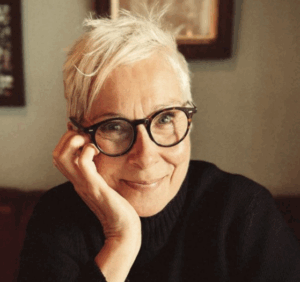
Lucy Musgrave OBE describes herself as ‘the luckiest person on the planet’. Photo credit: Jenny Zarins
Urban designer Lucy Musgrave OBE describes herself as ‘the luckiest person on the planet’. She has worked for 30 years on award-winning high profile design projects including re-designs for Bond Street, Hanover Square and Burlington Gardens in Central London, and has helped set policies for removing traffic gyratories like Aldwych Strand and making cities like London child friendly. Lucy is the founding director of London-based Publica, alongside the company’s CIC campaign which, along with Dr. Ellie Cosgrave, is advocating for safety in public spaces for women, girls and gender diverse people. She is married to Zad Rogers, has four daughters and lives in central London. Lucy is a Mayoral Design Advocate for the London Mayor and a Trustee of the charity Grand Plan. She was also a Public Practice Board Member, a Barbican Arts Centre Board Member, and a member of the Night-Time Commission for the Mayor of London before she was diagnosed with leukaemia.
In 2021 Lucy didn’t realise that her busy and creative life was about to be put on hold with her biggest challenge ever. But in typical fashion, she has now turned her shock leukaemia diagnosis into an incredible initiative that has not only raised tens of thousands of pounds but is spreading the simple joy and positive thinking that carried her through her trauma.
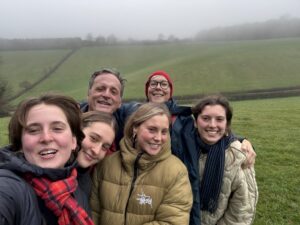
Lucy on holiday with her family
“I’ve been really lucky in my life, I’ve never been seriously ill or had to take a day off work,” said Lucy, now aged 58. “But in April 2021 I was going through an incredibly stressful work moment and I got ill. First it was mild shingles, then in the summer I got flu and couldn’t shake it off. I couldn’t lift my head off the pillow. I was in bed for ten days and not able to function, it was so weird for me. It was during covid and you couldn’t get to see a GP so I did a video call. The covid test was negative but she said: “you’ve just got a viral infection.” In August I told it was probably post-viral fatigue. We went on a family holiday to the South of France with my in-laws and by the time we took the train back home again I found it hard to walk.
“When I got home I contacted a private GP which my brother-in-law recommended. He gave me a blood test and rang me the next day and told me to immediately go to A&E. I thought: “Fantastic, someone is taking me seriously.”
“I went to University College London Hospital (UCLH) which was the nearest to our home. It was a nightmare. It took many hours in A&E. Eventually they put me into a side ward, but I had to sit in a chair. Sometime late at night when I was still waiting I could see an empty bed and I crawled across and lay down on it, although the nurse tried to tell told me I couldn’t. I had no choice. I could hardly sit up by that point.
“The next morning – 9th September 2021 – they put me in a big room upstairs in the tower part of the hospital. I was happy I could look east and see my home from the window. The registrar said my husband Zad needed to come, so I thought: “OK here we go, I’ve got cancer and I’m going to be told I’ve got six months to live.” My next thought was: “But that’s ok. I’ve been the luckiest person on the planet, I just need time to sort some stuff out for my daughters, spend time with them and say the things I need to say, plant the 150 oak saplings I was growing and spend time with Zad.”. It was a strange reaction for me to have.
“Zad arrived and the consultant, a wonderful man called Mr Gupta stood at the end of my bed said: “You have acute myeloid leukaemia but it is curable.” He said it was his job to ensure I lived until my 80s or 90s but that if they didn’t start treatment straight away I wouldn’t make it to Christmas. I said: “OK. Let’s start!” and then to my horror thought how three months wasn’t going to be long enough to get everything done and that I was sure they wouldn’t let me out of here. I then looked to my side and saw my husband completely broken. It was then that it hit me how it wouldn’t be just about me and how I coped, but it would be incredibly traumatising for other people. And we needed to tell the girls and our family.
“The nurses were incredible. My first nurse was called Bert. He wrote on my white board ‘Humour is healing’ and said: “It’s my job to make you laugh every day.” While all the preparations were made for my treatment to start, I had to work out how to tell my work team, clients and collaborators. The nurses said I was the only patient that got dressed every day in those early days – it was because I had to speak to so many people on my laptop.”
Lucy was given blood transfusions and three days later her Daunorubicin and Cytarabine chemotherapy started.
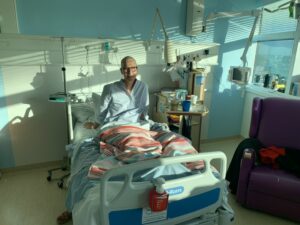
Lucy getting treatment at the hospital
“I had four rounds of chemo that each lasted about 12 or 13 days and overall spent six months in hospital, quite cocooned up with my incredible nurses as it was covid time. I had periods at home in between the intense treatment. Early on it felt like my body was breaking down, I had mouth sores and my hair fell out after a couple of weeks. I was going to get my hairdresser Richard to come and shave my hair but it started falling out so quickly that Bert said he would do it for me – that felt like an amazing act of care. The third round that started on New Year’s Day was the worst – I thought I could cope but by that time it became clear that I couldn’t. I kept my complete focus on this tiny bit of positive energy and belief. I had very very little energy but it was positive energy. That’s what got me through.”
Lucy finished her in-patient treatment in March 2022 and was put on a year’s maintenance treatment of Midostaurin, a type of cancer growth blocker called a tyrosine kinase inhibitor (TKI).
“They had lined up a stem cell donor – my sister Celia – in case the chemotherapy didn’t work and I needed a transplant. Celia was unusually almost a 100 per cent match and we found out she’d been on the bone marrow donor list for 20 years but none of us knew! She is amazing. Fortunately it wasn’t needed.”
Lucy started her recovery at home and began working one day a week from April 2022.
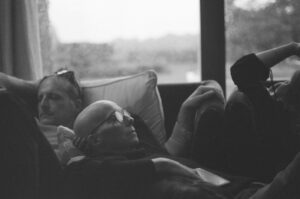
Lucy with her husband Zad during recovery
“I found it really difficult to be a patient and ask for help. I learnt a lot from others who live with chronic disease that rely on the ‘spoons theory’ and that you have to ask for support. You wake up and you have ten spoons of energy for the day and you decide how you spend them. If someone wants a meeting at 4pm but I’ve still got to get home and cook supper, I know that will take two spoons and I’ve only got two left then I can’t do that meeting. It took me around two years to work this out and start really asking for help.
“I’m now back to working four days a week. I’m on six monthly checks and have done my last bone marrow biopsy. That was an amazing moment. Two years after diagnosis I suddenly asked a whole load of questions which my consultant said was very normal. I had never asked anyone about my survival chances and had been told not to look at the internet which I hadn’t. I learnt I shouldn’t really be here – there was a 40 – 50% chance that I’d make it.”
The experience of her shock diagnosis and recovery, and her determination to hold on to the positive energy, has spurred Lucy to spearhead an incredible fundraising drive.
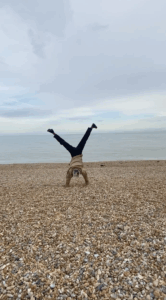
Lucy has been cartwheeling everyday since Jan 1st 2023
“When I was diagnosed my two best friends, Sadie and Liesel, said if you get out of here we’re taking you anywhere you want in the world. I did get out, and knew exactly where I wanted to go – Isla Espíritu Santo, an uninhabited island in the Sea of Cortez in Mexico. It is a marine conservation site that a friend had been instrumental in protecting and he memorialised this act by commissioning the sculptor Cristina Iglesias to make a piece of sculpture which she placed on the seabed, eventually to be covered in sea life. I wanted to dive it. We have a longstanding family joke that I do one cartwheel a year to remind myself of feeling free and full of joy. Well I came out of the sea there and on the beach I did 12 cartwheels to represent my terrible year and that I had survived, with my friend Liesel holding the camera!
“A few weeks later I was back at UCLH for the 2022 Christmas party, part of which involved hearing speeches from people who were doing fund-raising by running marathons, swimming, long cycle treks and other challenges to raise funds for UCLH’s Haematology Cancer Care (HCC) charity, some in memory of lost family members. I stood there, glass of wine in hand, poleaxed with emotion, thinking why did I survive and not their family members? And what could I do to help? I can’t even run for a bus. Then I thought – well I can do a cartwheel. So on 1st January 2023 I started doing a cartwheel a day and filming it. It’s been amazing, a small daily movement for joy created with and for positive energy. I’ve raised over £27,500 for the HCC.
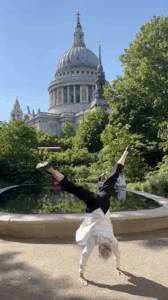
Join Lucy to do a cartwheel or any other joyful movement
“From June 2025, after my 1000th cartwheel, I’m focusing my attention to raising money for Leukaemia UK because leukaemia research is also a gateway to treatments for other cancers. When I went to Leukaemia UK’s ‘Who’s Cooking Dinner?’ evening at the Dorchester I was very privileged to sit next to Callan Brett who shared her story about the terrible loss of her son Henry. She asked why I was there, and very humbled, I said I was just there to do a cartwheel. Callan said: “The thing about a cartwheel Lucy, is you can’t do an angry cartwheel!”. That said everything to me, you can’t and it summarised my attitude to positive energy.
“My doctors said that if I was diagnosed five years before they wouldn’t have been able to treat me. Every year there are huge leaps in research. Every family in the UK will be touched by cancer in some form. I want other people to join me in cartwheeling – or any other daily joyful movement of positivity that they want to do. Everyone can do their interpretation and together can raise a hell of a lot of money so that people don’t go through what I have been through.
“Another great thing that’s come from my work with Leukaemia UK is I went on a lab tour at my hospital, UCLH. I listened to these incredible John Goldman Fellows and other researchers presenting their work – and I found out one of them, Jessica Taube, was actually researching my cells! I’m literally part of the research. Research that might identify in the future a way of screening people for AML. That would change the whole world.”
Share your story
We want to help people tell and share the leukaemia stories that matter – stories like Lucy’s and stories like yours.
Related posts
7 November 2024
University of Southampton’s Dr Giorgia Chiodin Wins Olive Boles Innovation Award
Dr Giorgia Chiodin from the University of Southampton has been awarded the prestigious Olive Boles Innovation Award for 2024. Awarded annually to a Leukaemia UK John Goldman Fellow, this award…
25 August 2022
Leukaemia Care and Leukaemia UK join forces with funky feathered friend to make disease symptoms more memorable
The two leading UK leukaemia charities have launched a collaboration today with a difference. They’ve joined forces with a blue and gold Macaw parrot called Henry to create an original…
16 November 2021
John Goldman Fellowships for 2022 open in December
Leukaemia UK is delighted to continue its investment and funding for early career scientists and clinicians in 2022.
16 November 2023
Leukaemia UK appoints Hannah Peckham as newest Ambassador
Leukaemia UK has today announced its appointment of award-winning children’s book author, Hannah Peckham, as its newest celebrity Ambassador. Hannah joins the likes of actor Dougray Scott, celebrity chef Francesco…